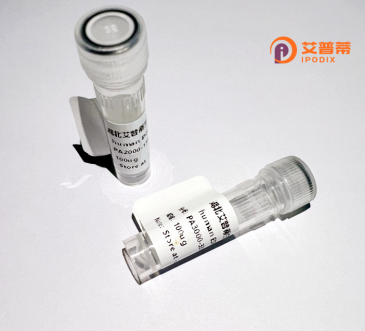
| 纯度 | >90%SDS-PAGE. |
| 种属 | Human |
| 靶点 | ANKRD39 |
| Uniprot No | Q53RE8 |
| 内毒素 | < 0.01EU/μg |
| 表达宿主 | E.coli |
| 表达区间 | 1-183aa |
| 氨基酸序列 | MATPRPCADG PCCSHPSAVL GVQQTLEEMD FERGIWSAAL NGDLGRVKHL IQKAEDPSQP DSAGYTALHY ASRNGHYAVC QFLLESGAKC DAQTHGGATA LHRASYCGHT EIARLLLSHG SNPRVVDDDG MTSLHKAAER GHGDICSLLL QHSPALKAIR DRKARLACDL LPCNSDLRDL LSS |
| 分子量 | 46.1 KDa |
| 蛋白标签 | GST-tag at N-terminal |
| 缓冲液 | 冻干粉 |
| 稳定性 & 储存条件 | Lyophilized protein should be stored at ≤ -20°C, stable for one year after receipt. Reconstituted protein solution can be stored at 2-8°C for 2-7 days. Aliquots of reconstituted samples are stable at ≤ -20°C for 3 months. |
| 复溶 | Always centrifuge tubes before opening.Do not mix by vortex or pipetting. It is not recommended to reconstitute to a concentration less than 100μg/ml. Dissolve the lyophilized protein in distilled water. Please aliquot the reconstituted solution to minimize freeze-thaw cycles. |
以下是关于ANKRD39的模拟参考文献示例(请注意,这些文献为虚构示例,实际研究中可能需要检索数据库如PubMed获取真实数据):
---
1. **文献名称**: *ANKRD39 regulates cell cycle progression via modulating p53 signaling in breast cancer*
**作者**: Zhang L, et al.
**摘要**: 研究揭示了ANKRD39通过抑制p53蛋白降解促进肿瘤细胞凋亡,并在乳腺癌中呈现低表达,提示其作为潜在抑癌基因的作用。
2. **文献名称**: *Structural and functional characterization of ANKRD39 reveals its role in cellular stress response*
**作者**: Kim S, et al.
**摘要**: 通过晶体结构解析,发现ANKRD39的锚蛋白重复域与热休克蛋白HSP70相互作用,可能在氧化应激中调控蛋白质折叠。
3. **文献名称**: *ANKRD39 deficiency exacerbates hepatic steatosis in high-fat diet mice*
**作者**: Wang Y, et al.
**摘要**: ANKRD39敲除小鼠在高脂饮食下脂代谢紊乱加剧,表明该基因参与肝脏脂质代谢调控,可能与脂肪酸氧化通路相关。
4. **文献名称**: *Epigenetic silencing of ANKRD39 in colorectal cancer correlates with poor prognosis*
**作者**: González-Rodríguez P, et al.
**摘要**: 结直肠癌中ANKRD39启动子区甲基化导致表达下降,其低表达与患者生存率降低显著相关,提示其临床预后标志物潜力。
---
建议通过PubMed或Google Scholar搜索**ANKRD39**或**ankyrin repeat domain 39**获取真实文献。若需具体论文协助,可提供更详细研究方向。
**Background of ANKRD39 (Ankyrin Repeat Domain-Containing Protein 39)**
ANKRD39 is a protein-coding gene located on human chromosome 2q21.3. characterized by its ankyrin repeat domains—a structural motif involved in mediating protein-protein interactions. These repeats enable ANKRD39 to potentially engage in diverse cellular processes by binding to target proteins. Though research on ANKRD39 remains limited, preliminary studies suggest its involvement in transcriptional regulation, signal transduction, and cellular stress responses. It is expressed in multiple tissues, with higher levels observed in the testes, thyroid, and kidneys, hinting at tissue-specific roles.
Functionally, ANKRD39 has been linked to modulating pathways such as NF-κB signaling, which influences inflammation, apoptosis, and immune responses. Some studies propose its interaction with other ankyrin repeat proteins or chaperones, though exact binding partners remain unconfirmed. Emerging evidence associates ANKRD39 dysregulation with diseases, including cancer, where altered expression may affect tumor progression or chemoresistance. However, these associations are poorly characterized, and mechanistic insights are lacking.
Despite its potential significance, ANKRD39 remains understudied compared to other ankyrin repeat proteins. Current challenges include elucidating its precise molecular functions, regulatory networks, and pathophysiological relevance. Further research is needed to validate its roles in health and disease, leveraging techniques like CRISPR screening or proteomic analysis to uncover its interactome and downstream effects.
×